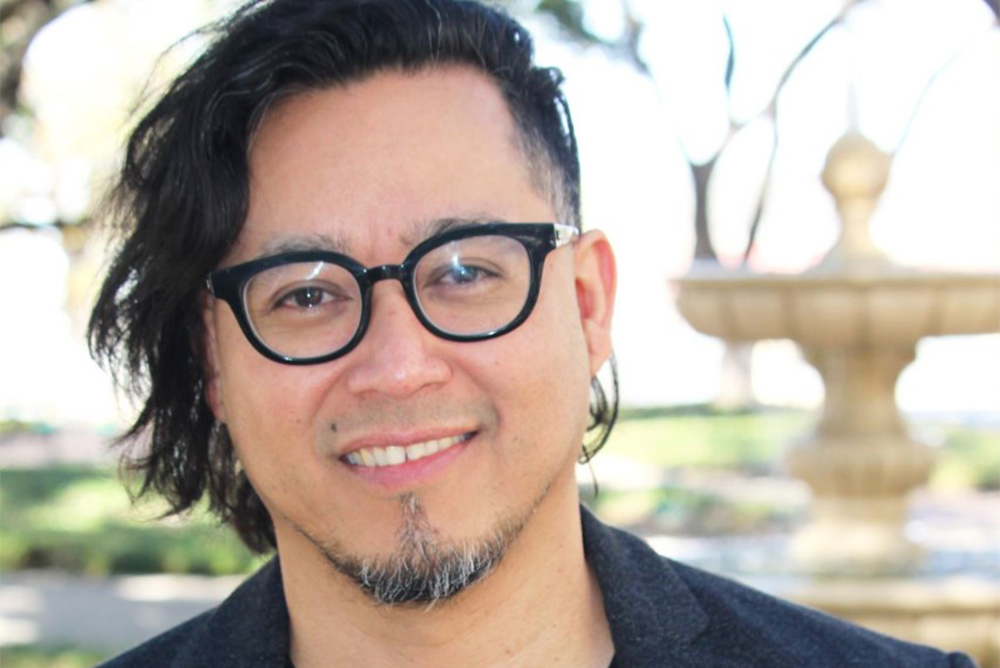
Courtesy of Octavio Quintanilla.
Octavio Quintanilla is author of If I Go Missing and former poet laureate of San Antonio, Texas. The founder and director of VersoFrontera, a literature and arts festival, and publisher of Alabrava Press, he also teaches literature and creative writing at Our Lady of the Lake University. Zócalo’s January poetry curator, Quintanilla chatted in our green room about visual poetry, Spain, and Dostoyevsky.
What are you currently reading?
James Henry Knippen’s poetry book Would We Still Be. Of visual poetry, I’m reading Jennifer Sperry Steinorth’s Her Read: A Graphic Poem. I’m also rereading Federico García Lorca’s anthology. When it comes to poetry, I read the books more than once. The first time is to enjoy it, and then the second time is to extract their process and learn from them.
How has the pandemic affected how you think about or write poetry?
During 2020 I started a series of visual poems called “Los Días Oscuros,” which can be translated to “The Dark Days.” I documented, daily, some aspect of how the pandemic affected me, whether intellectually or psychologically. The pandemic made it necessary to find a different language to process my emotional landscape.
What social media website do you spend most of your time on?
My daughter has been telling me to get TikTok, and I’ve been refusing because I don’t understand it. But I’ve been doing quite a bit of Instagram. I kind of like putting music on them; it’s like you’re creating a narrative with the music.
If you didn’t live in the United States, what country would you want to live in?
Spain. I’ve been there three times. This past summer, I had a residency at the University of Alcalá, and I spent a month writing and painting and getting to cruise around the Madrid area and countryside. I really feel comfortable there.
As a kid, what did you wanted to be when you grew up?
I couldn’t articulate it back then, but I think I wanted to do this—living the creative life. I was a kid who loved listening to grownups talk. I grew up in Mexico until I was 9, so we would go visit my grandparents at la rancheria. Back then, there was no electricity or TV, so people would sit outside and smoke cigarettes and talk and tell stories. There I was, just listening, and my imagination would go wild.
What’s your favorite snack for this time of the year?
I love hot chocolate. I love it at this time, when it’s cold and dark and rainy and I’m inside with nowhere to go.
Who is one person, dead or alive, that you’d want to grab drinks with?
I’d have to say Dostoyevsky. I love Russian literature. When I graduated from high school, I found out about him, and he was a big influence. Before I wanted to be a poet, I wanted to be a novelist and write thick novels like him. It’d be cool to just listen to him; to me, he was a genius and I wonder just what he’d say to me, a Mexican American. He’d probably never met a Mexican American in his life.
What’s one song that would get you on the dance floor?
Every time I hear Just Like Heaven by the Cure, I wish I knew how to dance. But you don’t need a lot of skills to dance after having a few drinks.
How do you procrastinate?
I’ve been thinking a lot about that because I procrastinate a lot. But to me, procrastination is a good thing. It doesn’t mean you’re not doing anything. It just means you’re processing so by the time you sit down and do it, you’re ready. Sometimes, not doing something I’m supposed to be doing gives me opportunities and ideas to go about doing it. I see it as part of the process of creativity.



